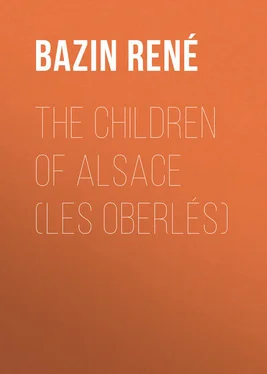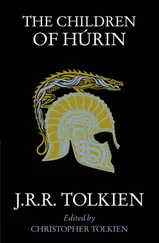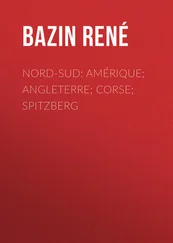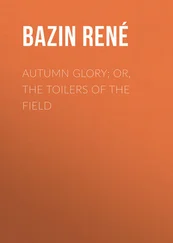René Bazin - The Children of Alsace (Les Oberlés)
Здесь есть возможность читать онлайн «René Bazin - The Children of Alsace (Les Oberlés)» — ознакомительный отрывок электронной книги совершенно бесплатно, а после прочтения отрывка купить полную версию. В некоторых случаях можно слушать аудио, скачать через торрент в формате fb2 и присутствует краткое содержание. ISBN: , Жанр: foreign_language, foreign_antique, foreign_prose, на английском языке. Описание произведения, (предисловие) а так же отзывы посетителей доступны на портале библиотеки ЛибКат.
- Название:The Children of Alsace (Les Oberlés)
- Автор:
- Жанр:
- Год:неизвестен
- ISBN:http://www.gutenberg.org/ebooks/34957
- Рейтинг книги:5 / 5. Голосов: 1
-
Избранное:Добавить в избранное
- Отзывы:
-
Ваша оценка:
- 100
- 1
- 2
- 3
- 4
- 5
The Children of Alsace (Les Oberlés): краткое содержание, описание и аннотация
Предлагаем к чтению аннотацию, описание, краткое содержание или предисловие (зависит от того, что написал сам автор книги «The Children of Alsace (Les Oberlés)»). Если вы не нашли необходимую информацию о книге — напишите в комментариях, мы постараемся отыскать её.
The Children of Alsace (Les Oberlés) — читать онлайн ознакомительный отрывок
Ниже представлен текст книги, разбитый по страницам. Система сохранения места последней прочитанной страницы, позволяет с удобством читать онлайн бесплатно книгу «The Children of Alsace (Les Oberlés)», без необходимости каждый раз заново искать на чём Вы остановились. Поставьте закладку, и сможете в любой момент перейти на страницу, на которой закончили чтение.
Интервал:
Закладка:
"Do you suppose we have disturbed your grandfather?" asked M. Ulrich, getting up, and pointing with his hand to the wall which separated the young man's room from that of the sick man.
"No," said Jean; "he hardly sleeps at all now – I am sure it has pleased him to hear me laugh. As my family left me at five o'clock I spent a good deal of my time with him, and I watched him closely. He hears and understands everything. He recognised your voice, I am sure, and perhaps he has caught a word here and there."
"That will have pleased him, my boy. He belongs to the very old Alsace, that country which seems almost fabulous to you, and to which I also belong, although I am much younger than M. Oberlé. It was wholly French, that Alsace, and not a man of that time has changed. Look at your grandfather – look at old Bastian. We are the generation who suffered. We represent grief – we others. Your father embodies resignation."
"And I?"
Uncle Ulrich looked at the young man, with his far-seeing eyes, and said:
"You – oh, you are Romance."
They would have smiled, both of them, but they could not, as if that word had been too perfectly accurate, which is not always the case with human judgments – as if they felt that Fate was there in this room, invisible, who repeated to them at the bottom of their hearts at the same time: "Yes, it is true – "this one is Romance." The grief which was oppressing them was only to be explained by the imminence of life's mystery. It faded away. M. Ulrich reached out his hand to his nephew, more gravely than he would have done if that word had not escaped him, which he did not regret, but which remained present with him.
"Good-bye, dear Jean. I would rather not wait for my brother-in-law. I do not know what attitude I should take up towards him. All you have told me would embarrass me. You will wish him good night for me. I will go home through the woods by moonlight. What a pity I have not my gun with me and the good luck to come across a brace of grouse in the fir wood."
To reach the staircase he took some careful steps on the carpet in the passage.
"Uncle," said Jean, in a low tone, "if you would go to my grandfather I am sure he would be pleased – I am sure he is not sleeping."
Uncle Ulrich, who was walking in front, stopped and retraced his steps. Jean turned the handle of the door near which he was, and going first into the room, said, in a lowered voice:
"Grandfather, I bring you a visitor – Uncle Ulrich – who wishes to see you."
They were in the semi-darkness of a large room, the curtains of which had been drawn, and a nightlight, in transparent china, placed at the end of the room on the left between the closed window and a bed which occupied the corner, was the sole light. On the table beside the bed, in the little luminous halo which surrounded the nightlight, was a small crucifix of copper, and a gold watch, the only shining objects in the room. In the bed an old man was sitting rather than lying, his shoulders covered with a grey wool crossover, his back and head supported by pillows, his hands hidden under the sheets, which still kept the folds of the linen press. A tapestry riband, serving as bell-cord and finishing in a fringe, reached to the middle of the bed. The man who was sleeping or waking there was impotent. Life with him was withdrawing more and more within. He walked and moved with difficulty. He no longer spoke. Under his thick, pale cheeks his mouth moved only to eat and to say three words – three cries – always the same: "Hunger, Thirst. Go away!" A sort of senile laziness allowed his jaw to hang, the jaw that had commanded many men. M. Ulrich and Jean went to the middle of the room without his giving the least sign that he was conscious of their presence. This poor human ruin was, however, the same man who had founded the factory at Alsheim, who had raised himself from the condition of a little country proprietor, who had been elected protesting deputy, who had been seen and heard in the Reichstag, claiming the unrecognised rights of Alsace and demanding justice of Prince Bismarck. Intelligence was watching, imprisoned, like the flame which lit up the room that night; but it expressed itself no longer. In this uninterrupted dream what men and things must pass before the mental vision of him who knew the whole of Alsace, who had gone through it in every direction, who had drunk of its white wines at all the tables of the rich and the poor; traveller, merchant, forester, and patriot! And it was he – this wrinkled bald head, this lowering face, these heavy eyelids, between which a slow, sad eye slipped to and fro like a billiard ball in the immovable slit of a bell. However, the two visitors had the impression that his gaze rested on them with an unusual pleasure.
They kept silence so as to let the old man savour the sweetness of a thought they would never, never know. Then Uncle Ulrich went near the bed, and, placing his hand upon the arm of Philippe Oberlé, bending down slightly to be nearer his ear and to more easily meet his eyes, which were raised with difficulty:
"We have talked a good deal, M. Oberlé, your grandson and myself. He is a good fellow – your Jean!"
A movement of the whole upper part of the body slowly changed the position of the head of the old man, who was trying to see his grandson.
"A good fellow," continued the forester, "whose stay in Berlin has not spoiled him. He has remained worthy of you – an Alsatian, a patriot. He does you honour."
Though there was only the tiny floating light in the room, Uncle Ulrich and Jean thought they perceived a smile on the face of the old man, the answer from a soul still young.
They quietly withdrew, saying:
"Good night, M. Oberlé. Good night, grandfather."
The flame of the nightlight flickered, displacing lights and shadows; the door was shut, and the interrupted dream continued in the room, where hardly anything had entered since sunset save the hours struck in the belfry of the church of Alsheim. M. Ulrich and his nephew parted at the foot of the staircase. The night was cold, the grass all white with frost.
"Good time for walking!" said M. Ulrich; "I shall expect you at Heidenbruch."
He whistled for his dog, and stroking its red-brown head, said:
"Take me home, for I am going to dream all the time of what that boy told me!"
Scarcely had he gone some few hundreds of yards – the sound of his footstep could still be heard on the road going up towards the Wood of Urlosen – when in the calm of the night Jean caught the sound of the trotting horses coming from the Obernai district. The noise of their shoes striking the metalled road sounded like flails on a threshing-floor; it was a rural sound, and not disturbing; it broke no rest. Fidèle, who was barking furiously towards the edge of the forest, must have had other reasons to show her teeth and give tongue. Jean listened to the carriage coming nearer. Soon the noise grew less and less, then became deadened, and he knew that the carriage had passed between the walls of the village, or at least had entered the circle of orchards which made Alsheim in the summer a nest of apple-trees, cherries, and walnuts. Then it swelled and sounded clear like a train coming out of a tunnel. The gravel scrunched at the end of the avenue. Two lamps turned and passed rapidly across the park; the grass, the shrubs, the lower trunks of trees, arose abruptly out of the darkness and as abruptly sank back into it again, and the brougham stopped before the house. Jean, who had remained at the top of the staircase, went down and opened the door. A young girl got out at once; her face was rosy, and she was wrapped all in white – white mantilla, coat of white wool, and white shoes. In passing, almost in the air, she bent to the right, just touched Jean's forehead with a kiss, and half opened two lips heavy with sleep.
Читать дальшеИнтервал:
Закладка:
Похожие книги на «The Children of Alsace (Les Oberlés)»
Представляем Вашему вниманию похожие книги на «The Children of Alsace (Les Oberlés)» списком для выбора. Мы отобрали схожую по названию и смыслу литературу в надежде предоставить читателям больше вариантов отыскать новые, интересные, ещё непрочитанные произведения.
Обсуждение, отзывы о книге «The Children of Alsace (Les Oberlés)» и просто собственные мнения читателей. Оставьте ваши комментарии, напишите, что Вы думаете о произведении, его смысле или главных героях. Укажите что конкретно понравилось, а что нет, и почему Вы так считаете.












